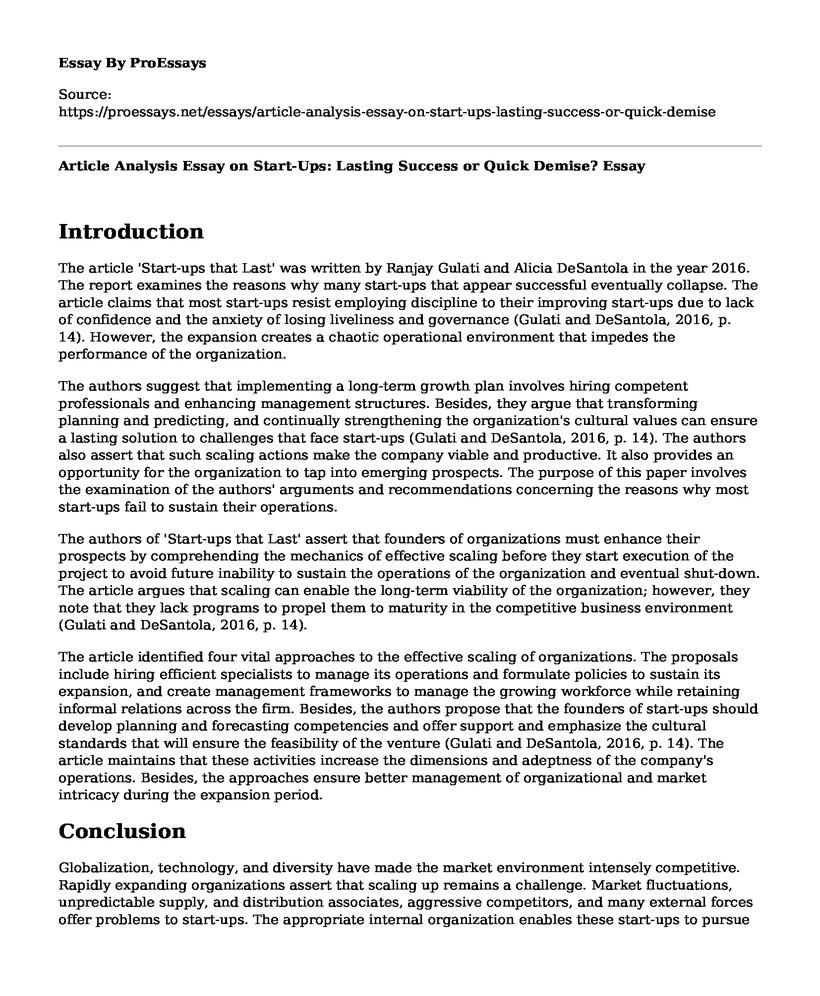Introduction
The article 'Start-ups that Last' was written by Ranjay Gulati and Alicia DeSantola in the year 2016. The report examines the reasons why many start-ups that appear successful eventually collapse. The article claims that most start-ups resist employing discipline to their improving start-ups due to lack of confidence and the anxiety of losing liveliness and governance (Gulati and DeSantola, 2016, p. 14). However, the expansion creates a chaotic operational environment that impedes the performance of the organization.
The authors suggest that implementing a long-term growth plan involves hiring competent professionals and enhancing management structures. Besides, they argue that transforming planning and predicting, and continually strengthening the organization's cultural values can ensure a lasting solution to challenges that face start-ups (Gulati and DeSantola, 2016, p. 14). The authors also assert that such scaling actions make the company viable and productive. It also provides an opportunity for the organization to tap into emerging prospects. The purpose of this paper involves the examination of the authors' arguments and recommendations concerning the reasons why most start-ups fail to sustain their operations.
The authors of 'Start-ups that Last' assert that founders of organizations must enhance their prospects by comprehending the mechanics of effective scaling before they start execution of the project to avoid future inability to sustain the operations of the organization and eventual shut-down. The article argues that scaling can enable the long-term viability of the organization; however, they note that they lack programs to propel them to maturity in the competitive business environment (Gulati and DeSantola, 2016, p. 14).
The article identified four vital approaches to the effective scaling of organizations. The proposals include hiring efficient specialists to manage its operations and formulate policies to sustain its expansion, and create management frameworks to manage the growing workforce while retaining informal relations across the firm. Besides, the authors propose that the founders of start-ups should develop planning and forecasting competencies and offer support and emphasize the cultural standards that will ensure the feasibility of the venture (Gulati and DeSantola, 2016, p. 14). The article maintains that these activities increase the dimensions and adeptness of the company's operations. Besides, the approaches ensure better management of organizational and market intricacy during the expansion period.
Conclusion
Globalization, technology, and diversity have made the market environment intensely competitive. Rapidly expanding organizations assert that scaling up remains a challenge. Market fluctuations, unpredictable supply, and distribution associates, aggressive competitors, and many external forces offer problems to start-ups. The appropriate internal organization enables these start-ups to pursue emerging prospects and provide lasting survival strategies.
References
Gulati, R. and DeSantola, A., 2016. Start-ups that last. Harvard business review, 94(3), p.14. Retrieved from https://dialnet.unirioja.es/servlet/articulo?codigo=5534815
Cite this page
Article Analysis Essay on Start-Ups: Lasting Success or Quick Demise?. (2023, Apr 24). Retrieved from https://proessays.net/essays/article-analysis-essay-on-start-ups-lasting-success-or-quick-demise
If you are the original author of this essay and no longer wish to have it published on the ProEssays website, please click below to request its removal:
- Is Business Ethics an Oxymoron? - Essay Sample
- Essay Sample on Entrepreneurship: Design, Launch, Profit
- Essay Example on Globalization: A Profitable Opportunity for Businesses Worldwide
- International Expansion: Navigating the Competitive Global Marketplace - Research Paper
- Become an Entrepreneur: Find Your Niche and Research the Market - Essay Sample
- Balancing Career & Family: The Warm Fuzz Case Study
- Essay Example on Corporate Law: Transaction Costs & Collective Action







